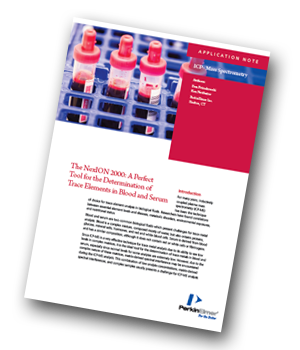PerkinElmer has produced an application note demonstrating the advantages of the NexION 2000® ICP-MS for trace elemental analysis in blood and serum and explores the ability to simplify sample preparation, which is a direct result of the instrument’s advantages.
 Introduction
Introduction
Since ICP-MS is a very effective technique for trace metal analysis due to its ability to see low levels in complex matrices, it is the ideal tool for the determination of trace metals in blood and serum, especially since normal levels for some analytes are extremely low. However, due to the complex nature of these matrices, matrix-derived spectral interference may be encountered during the ICP-MS analysis. This combination of low analyte concentrations, matrix-derived spectral interferences, and complex samples usually presents a challenge for ICP-MS analysis. However, PerkinElmer’s NexION® 2000 ICP mass spectrometer is a perfect tool for the determination of trace elements in blood and serum due to a number of design characteristics.
Features of the NexION 2000
With its unique free-running solid-state RF generator, Triple Cone Interface, and Quadrupole Ion Deflector, the NexION 2000 has a high tolerance for total dissolved solids, allowing a simple “dilute and shoot” approach for sample preparation and analysis. The productivity configuration of the NexION 2000 is equipped with the FAST system that can greatly improve productivity in clinical testing laboratories. Finally, with the ability to use three cell gases in the Universal Cell, the NexION 2000 allows the most appropriate gas and mode to be used for analysis, providing the most effective removal of interferences and the lowest levels to be accurately measured, limited only by the cleanliness of the reagents and laboratory environment.
Experimental
Blood and serum samples were prepared for analysis in two different ways: a 50x dilution with acidic or basic diluents. Since all standards and samples were prepared with the same amount of diluent, internal standards (Ga, Rh, and Ir) were added to the diluent.
Conclusion
This work has demonstrated the ability of PerkinElmer’s NexION 2000 ICP-MS to perform accurate, stable analyses of blood and serum samples. Accurate results can be attained using either a basic or acidic diluent for standard and sample preparation. With the Universal Cell and the ability to use three cell gases in a single method, the most appropriate interference-reduction strategies can be used for interference elimination, guaranteeing superior low-level analysis capabilities, limited only by contamination.




